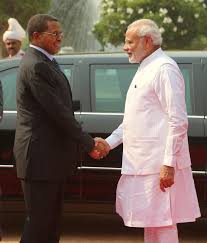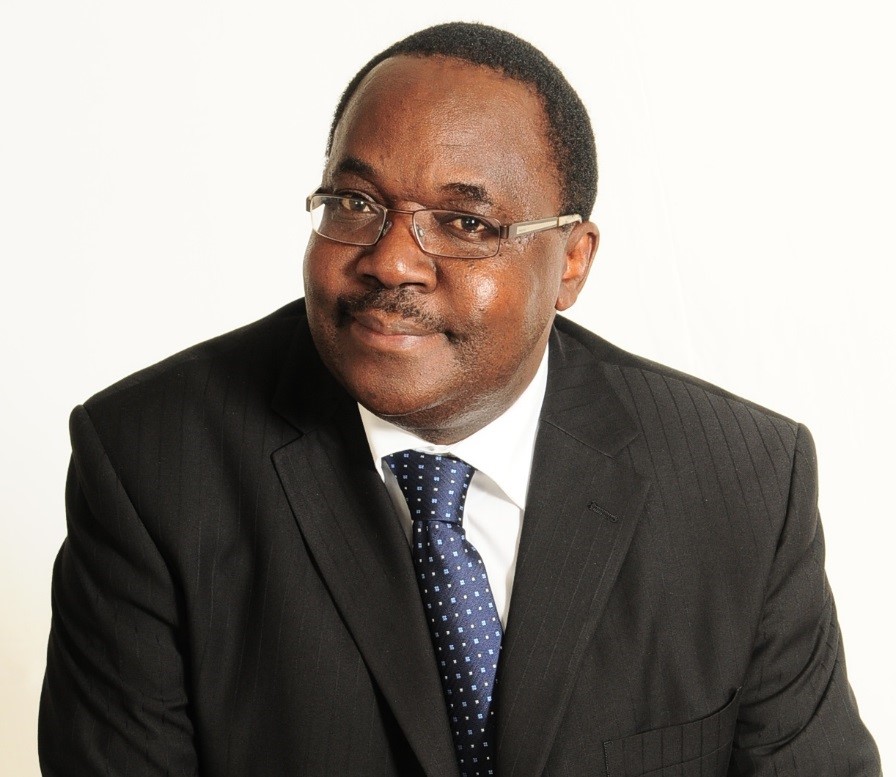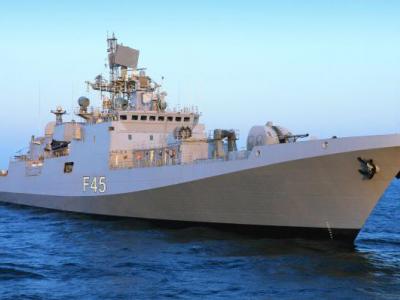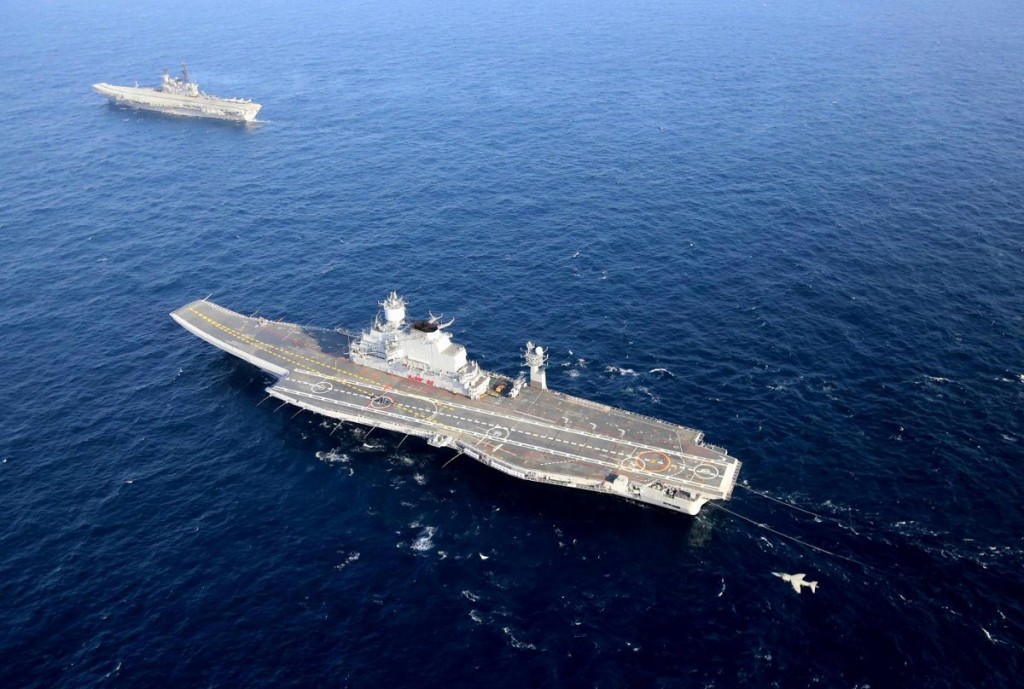“Terrorism in our respective regions is a concern for both countries. We have agreed to establish a joint working group to strengthen our cooperation in counter-terrorism,”
By TZ Business News Staff and Agencies

From Left: Tanzania President Jakaya Mrisho Kikwete, with India’s Prime Minister Narendra Modi during Kikwete’s recent visit to India
New Delhi: India is to extend its cooperation to Tanzania in various sectors, including counter-terrorism, natural gas and maritime security, the country’s Prime Minister Narendra Modi told reporters in New Delhi during President Jakaya Kikwete’s June, 2015 visit to this nation.
New Delhi is also set to introduce the e-tourist visa scheme to Tanzania nationals wanting to travel to this federation, the Prime Minister said, according to Zeenews.india.com.
“Indian investments in Tanzania exceeds three billion US dollars and covers many areas….I offered our cooperation in the development of the potentially niche natural gas sector in Tanzania. We discuss cooperation in maritime sector and ocean economy. The agreement on hydrography is an important step in our cooperation in this sector,” Prime Minister Modi said, in his joint statement with Tanzanian President Jakaya Kikwete.
“We are pleased to be partners in development of human resources, healthcare, agriculture, institutions and infrastructure in Tanzania…I have informed the Tanzanian President that we will soon extend out e-tourist visa scheme to Tanzania…We greatly appreciate Tanzania’s support for India candidature for a permanent seat in an expanded UN security council,” he added.
Addressing the issue of terrorism, the Prime Minister said that India and Tanzania have agreed to set-up a joint working group to strengthen the cooperation in counter-terrorism. “Terrorism in our respective regions is a concern for both countries. We have agreed to establish a joint working group to strengthen our cooperation in counter-terrorism,” he said.
Meanwhile India, a member of the Indian Ocean Naval Symposium (IONS), a thirty five nation body that seeks to increase maritime co-operation among navies of the littoral states of the Indian Ocean, has also initiated close maritime security links with Mozambique. IONS encourages the flow of information and cooperation between naval personnel.
In November 2014, the Indian Navy’s guided missile stealth frigate INS Teg visited the northern Mozambican port of Nacala. According to the Indian Government news service, the goodwill visit was aimed at strengthening the friendship between the two nations.
INS Teg set sail from Mumbai at the beginning of October, along with three other naval ships for a two month long deployment to Eastern Africa and the southern Indian Ocean region. Under the command of Rear Admiral R Hari Kumar, the ships called at several points en route to Nacala. After a stopover at the South African naval base at Simon’s Town, INS Teg took part in the India – Brazil – South Africa Maritime exercise (IBSAMAR) in the Indian Ocean.
Besides piracy, security problems in the Indian ocean include illegal fishing. Muscatdaily.com reported last year A murky practice known as Illegal, Unlicensed, Unregulated (IUU) fishing is costing Indian Ocean countries billions of dollars in lost revenue. Estimates of the cost of IUU fishing suggest that it may account for as much as one-fifth of the total global catch, valued anywhere between US$10bn and US$23.5bn per year.

KENYAN LOBBIES FOR TOP INTERNATIONAL MARITIME SECURITY JOB :
On June 30, 2015, Kenya may have one of its own holding a coveted position that has eluded Africa for five decades. This is the Secretary General of the International Maritime Organisation (IMO).
And as if on cue, Juvenal Shiundu (in glasses above), after being nominated by the Government for the position, chose to officially launch his campaign aboard a historical ship.
Based in London, the HMS Wellington Ship is a floating Livery Hall and Headquarters of the Honourable Company of Master Mariners. It is here that acting Transport Cabinet Secretary James Macharia, joined Shiundu as he hosted a dinner for London-based ambassadors, high commissioners and permanent representatives of the 40 voting IMO council members.
IMO is a specialised UN agency, which sets global standards for safety, security and environmental performance of global shipping. The council will on June 30, decide who among six candidates will replace the Japanese Koji Sekemizu. Sekimizu’s term ends on December 31.
Shiundu is the organisation’s deputy director and head, programme management section based in London.
A naval architect, he joined IMO 17 years ago, after a stellar career in the maritime industry. He has worked as the general manager of African Marine and General Engineering, the largest shipyard on the East African Coast. He also has worked for the Kenya Ports Authority as assistant merchant shipping superintendent.
Backed by a good education, Shiundu acknowledges the six candidates running against him are equally competent and qualified. They are Andreas Chrysostomou from Cyprus, Vitaly Klyuev (Russia), Ki-tack Lim (Korea), Maximo Mejia (Philippines) and Andreas Nordseth (Denmark).
However, he is buoyed by a dose of self-belief, as the book he is currently reading, The power of self- Confidence, by Brian Tracy, attests.
“Let me offer my appreciation in advance to the council members who will be casting a vote of affirmative ballots in support of my candidacy,” said Shiundu at the London dinner to bouts of laughter.
“And enlist the support of undecided members to cause their respective pendulums to swing decisively in my direction,” he added.
But he is not relying on words only, as he is doing ‘intense legwork’ visiting world capitals of council members. In the course of this interview, we communicated with him while he was in Johannesburg, South Africa, Amsterdam and Netherlands, before he left for Madrid, Spain, then on to Washington DC in the United States.
While in South Africa, Shiundu, attended the African Union summit where African leaders endorsed him for the post, a much needed boost if he will have to break the ‘jinx’ Africa faces. Since the establishment of the IMO in 1959, there have been eight secretary generals, five from Europe, and two from Asia, and one from North America. Africa and Latin America, despite trying have not produced any. Source: Kenya Standard Digital
According to an independent UK-based Global Ocean Commission, this illegal practice makes it difficult to manage fishery quotas, it harms local fishermen who have to head deeper for their daily catch and, it is also linked to other crimes such as the trafficking of drugs, weapons and humans.
A report published in 2013 by the UN Monitoring Group on Somalia and Eritrea stated that with the decline in pirate activity, criminal networks were ‘reverting to prior, familiar patterns of illicit behaviour, including armed protection of fishing activities and illegal fishing’.
Piero Mannini, a senior fisheries officer (Near-East and North Africa) at the UN Food and Agriculture Organization’s (FAO) Near East Regional Commission for Fisheries said the organisation conducted the first regional review of IUU fishing in 2009. The FAO’s Secretary of the Regional Commission for Fisheries will also follow up on the problems of IUU fishing ‘later this year, or in the course of 2015’.
“In addition (the commission) has been considering the establishment of a regional database of violations,” Mannini added.
A number of non-governmental organisations, international bodies, and fisheries agencies monitor the problem created by IUU, which according to the Oceans Beyond Piracy Secure Fisheries project, was an ‘increased concern in the (Indian Ocean) region’. Robert Mazurek, director of the project said, “We don’t have concrete information on the level and extent of IUU fishing within Oman’s Exclusive Economic Zone (EEZ), though many think it is significant.”
Glen Forbes, founder of the maritime monitoring platform OCEANUSLive, said that a key aspect in the problem in identifying those responsible for IUU fishing was that they come under so many different flag states, along with changing ownership. “China clearly has a major impact, but Thai, Taiwanese, Indonesian, Spanish and Japanese fishing vessels are some of the major offenders,” he said.
“The Indian Ocean IUU problem is so big that it is a difficult region to monitor in any meaningful manner, and West Africa is no less an area of concern,” Forbes said, adding that, “Another issue is the fact that some IUU fishing vessels conduct nefarious deals with Somali states to get the right to fish in the waters, although the licences are invalid. Some dhows that have claimed to have been hijacked and then released by pirates have occasionally been suspected of having not paid the (Somali) security team who then turn on them before disembarking.”
Prime Minister Modi expressed delight India was Tanzania’s largest trading partner: “We are pleased to be Tanzania’s largest trading partner and a long standing development partner. I have assured President Kikwete of India’s continuing commitment to the relation with Tanzania. Our trade of over four billion US dollars is heavily in India’s favour. I urged President Kikwete to pan up more sectors for investments and exports,” the Prime Minister said.
“We have been partners in the cause of deeper cooperation among developing countries and a greater voice for them in international forums. We have shared aspirations for inclusive economic development. We have a common interest in maritime security in the Indian Ocean and a peaceful and prosperous Africa,” he added. Prime Minister Modi also said India and Tanzania share an emotional bond of shared history of struggle against colonialism.





